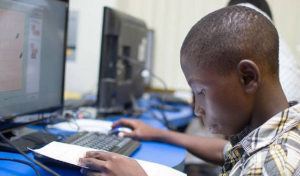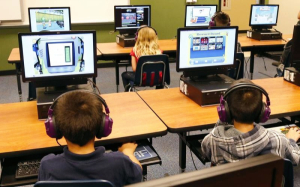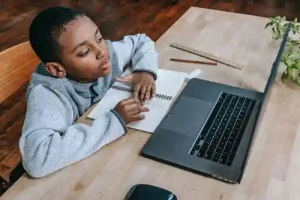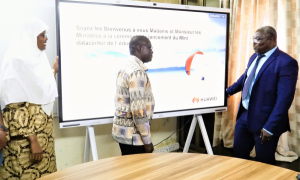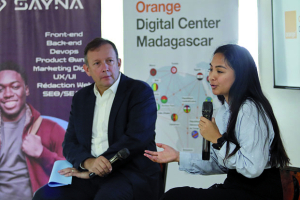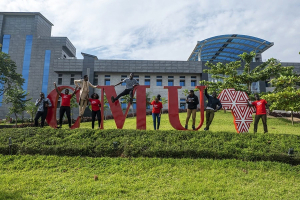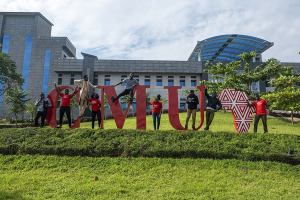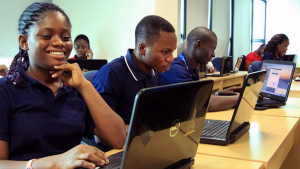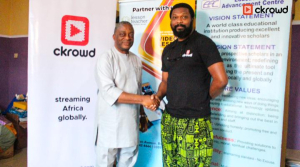Cameroon: SmartED Africa facilitates e-learning
In Africa, the edtech industry is growing fast, in the aftermath of the coronavirus pandemic that demonstrated the importance of digital transformation. Many startups are offering tailored solutions for students in that industry.
SmartED Africa is a digital solution developed by a Cameroonian eponymous startup. It provides access to courses, quizzes, and tests in various subjects. The start-up, based in Douala, was founded by Valerie Patricia Bararunyeretse, Simplice Tankoua, and Laba Kagalang.
The solution has an Android-only mobile app that allows users to register a SmartED Africa account, and choose their education level (class) to access the most helpful content. Although the app suggests the content most suited to every user’s education level, other content can be accessed via the side menu or even allow users to change their education level if they want to.
Users can watch or read the contents online or download them for offline access. The startup included the offline access feature to account for internet access issues that occur quite often in Africa.
SmartED Africa includes more than 500 lessons, 2,500 quizzes, and 200 tests per class in seven subjects. In the short term, the startup targets 10,000 app downloads. It also wants to increase its user base to 9,500 users and 6,500 subscribers. For now, its Playstore statistics show some thousand downloads.
Its pricing is as follows: XAF1,600 (US$2.41) monthly XAF3,100 quarterly or XAF4,600 annually. In 2022, it won the special women's prize during the Cameroonian chapter of the Orange Social Venture Prize. It thus won a check of XAF1 000 000 and 6-month coaching. It will also participate in the final phase of the competition involving 17 countries in which the Orange group operates.
Adoni Conrad Quenum
Libya: Abjab Teach connects schools and teachers with artificial intelligence
In recent years, many investors have positioned themselves in the African technology market. This influx motivates local tech entrepreneurs to devise interesting solutions for daily life problems.
Abjad Teach is an AI e-learning platform developed by Libyan ed-tech startup Abjad Limited, founded in 2018. It helps schools find the best teachers for their students.
The solution has a mobile app, available for Android and iOS devices. Teachers looking for their first work experience can sign up and showcase their profiles to schools looking for them. "Abjad will provide everything you need to know about your assignment, Contact details, expected pay, school profile, and other important information. You only see the jobs that suit your profile and interests. Get the best match by selecting your favorite schools, geographical area, subjects, and much more," the platform indicates in its welcoming message.
Thanks to artificial intelligence, schools that have open vacancies for teachers will see only the profiles that match their needs. “All you need to do is complete your school profile, upload jobs as required and Abjad will handle the rest of the application and recruitment process,” Abjad explains.
In 2022, Abjad was selected among 43 African start-ups that will participate in the social and inclusive Business Camp program sponsored by the French Development Agency. It is also among the winners of the Emerging Mediterranean program and will participate in the Emerging Valley summit in November.
Adoni Conrad Quenum
Nigeria: Edusko provides access to education finance
Guaranteeing quality education to children is probably the ambition most common to parents worldwide. However, the task can be challenging without access to the right information. In Nigeria, an edtech startup wants to assist in the process.
Edusko is a digital solution developed by Nigerian startup Edusko Africa founded in 2017. It is an education marketplace that lists and rates educational institutions, allowing parents to make “informed decisions.” By founding Edusko Africa, the two co-founders -Jide Ayegbusi and Bukola Owobello- wanted to set up a platform to help parents provide decent and affordable education to their children.
Thanks to the platform, “schools recruit more than 70 percent of their students with less than 10 percent of their marketing budget on our platform. Parents get as much as a 40 percent school fees discount, and can access low-interest education loans and stationery with ease,” Jide Ayegbusi indicates.
To access its services, the parents or guardians need to create an account by providing some personal information including their name, surname, email, and phone number. With its search bar, the platform allows parents to filter educational institutions depending on their desired criteria. It also helps users access financial support, whose interest is one of its income sources.
Edusko Africa currently claims partnerships with over 4,500 private schools while more than 50,000 parents in Nigeria’s 36 states have used the digital platform to select a school for their children. It also claims to have already collected over $150,000 in equity and grants. For the time being, the startup operates in Nigeria but, it intends to scale to other parts of the African continent, including Ghana, Kenya, Uganda, South Africa, and Egypt, in the next five years.
Adoni Conrad Quenum
The virtual university of Burkina Faso inaugurates its data center
Burkina Faso, like most countries, is constantly looking for innovative solutions to provide quality education to its entire population. To achieve this, the country has turned to ICTs because of the immense potential they offer.
Burkina Faso inaugurated, Tuesday (September 20), the data center of the virtual university of Burkina Faso. The data center (based in Ouagadougou) was inaugurated by ICT Minister Aminata Zerbo/Sabané (photo, left), and the Minister of Higher Education Frédéric Ouattara (photo, right).
It is a multi-task and multi-action infrastructure exclusively dedicated to education as its name (datacenter de l’éducation- datacenter for education) implies. According to Minister Aminata Zerbo/Sabané, it will help host digital resources and enable easier access to them. It will also allow the interconnection of the country's universities, and facilitate access to live classes.
"This is an important step in the integration of digital tools in higher education to improve the quality of the training offered and address the challenges faced by our universities, including overcrowding,” she said.
The data center is hosted by the National Agency for the Promotion of Information Technology and Communication (ANPTIC). It has great energy adaptation abilities and a broadband connection to facilitate access to educational resources that will be hosted.
For Minister Frédéric Ouattara, it will be useful in more ways than one, because "it will not only enable distance learning, e-classes and allow the streaming of remote or in-person classes. It will also allow demos and help deploy internet in the whole [higher education] system."
The school closure prompted by the coronavirus pandemic and the ongoing security crisis compelled Burkina Faso to place digitalization at the core of its education projects. In July 2022, 69 of its private and public university lecturers were trained in digital course scripting, design, and assessment.
The data center built with the technical support of Huawei is the first step of the innovative smart classroom project that the virtual university of Burkina Faso aims to launch soon.
Samira Njoya
Madagascar : Orange, Sayna bolster commitment to digital skills development
After raising $600,000 in April to support its growth, Malagasy edtech Sayna is partnering with Orange, one of its investors, to reach its flagship goal of training 8,000 developers by 2024.
Orange Madagascar and Malagasy edtech platform Sayna signed, Wednesday (September 14), two partnership agreements to offer tech digital skills to young Malagasies. The agreements were signed by Frederic Debord (photo, left), CEO of Orange Madagascar, and Matina Razafimahefa (photo, right), one of Sayna's co-founders. Under the agreements, Orange will deploy Sayna licenses, enabling access to the platform’s online courses for its learners’ network.
The two parties explain that "with Sayna's 100% online and gamified training, Orange is extending its impact, as far as digital inclusion and prompting equal opportunities are concerned, to the entire country.”
They add that thanks to the two agreements, Orange Digital Center Madagascar has become a partner space that will host in-person sessions and events organized by Sayna in Malagasy provinces.
Sayna was founded in 2018. By using cutting-edge techniques, it introduces young people to digital professions. It also takes care of their professional integration and assigns various business tasks to trainees, depending on their levels. Its teaching techniques earned the trust of many investors, including Orange Ventures.
The agreement between Orange and Sayna will enable access to the ed tech professional integration feature for the young people trained at the Orange Digital Center. “With the tasks assigned by Sayna to Orange Coding Academy learners, the latter will get paid professional experience that gives them hands-on training while awaiting their first jobs,” the two parties indicate.
Adoni Conrad Quenum
Smart Africa launches digital academy in Benin
In Africa, with the acceleration of digital transformation, there is currently a shortage of digital skills. The situation is concerning for various governments, which are stepping up efforts to create digital skill pools and reduce unemployment at the same time.
The Smart Africa Digital Academy (SADA) recently launched a national digital academy to promote digital skills in Benin. The founding memorandum of understanding was signed, last Thursday (September 8), by Lacina Koné (photo, right), CEO of Smart Africa, and Aurelie Adam Soule Zoumarou (photo, left), Beninese Minister of Digital Economy.
According to Lacina Koné, “SADA is a direct solution to the digital skill shortage facing Benin, in particular, and Africa as a whole. SADA Benin will support [authorities’] agenda that aims to place digital skills at the core of Africa’s current and future socioeconomic development.”
In the framework of the partnership agreement between Bening and the Smart Africa alliance, forty cybersecurity and artificial intelligence instructors are already being trained. Once their training is completed, those instructors will train and pass on their skills to other instructors to build a pool of qualified instructors. The SADA also plans to offer advanced ICT courses to managers and teachers.
Thanks to the reforms and flagship projects in the Beninese government's strategic plan, the country jumped from the 177th spot in the UN e-Government Development Index in 2016 to the 157th spot in 2020.
The SADA Benin initiative will therefore be a key support to the country’s digital transformation plan, which aims to transform Benin into a digital services hub in West Africa.
For Minister Aurelie Adam Soule Zoumarou, the alliance will "consolidate the efforts already undertaken by the Republic of Benin in the framework of its national development program and provide new cooperation opportunities.”
SADA Benin is the fourth national academy launched by Smart Africa since January 2022. The first three were in Congo, Rwanda, and Ghana. The alliance plans to launch similar academies in Burkina Faso, Côte d'Ivoire, Tunisia, Kenya, the Democratic Republic of Congo, Djibouti, and Sierra Leone in the coming months.
Since it began operations in August 2020, focusing on the Capacity Building for Decision Makers (CBDM) module, SADA has trained approximately 3,000 decision and policymakers across 26 countries on topics related to digital transformation and hot emerging technologies. Its goal is to train more than 22,000 people in partner countries, by 2023.
Samira Njoya
Tech training: Carnegie Mellon University, Mastercard Foundation partner to train 10k youth
In Africa, economically disadvantaged populations’ poor access to technological skills raises concerns about increasing inequalities in the job market. Actors are inking partnerships to ensure the digital economy benefits everyone.
Carnegie Mellon University Africa (CMU-A), the Mastercard Foundation, and the Rwanda government will train 10,000 African youth from economically disadvantaged communities in digital skills. For that purpose, the three parties signed a US$275.7 million agreement yesterday.
According to an official release, the investment provided by the Mastercard Foundation “includes a $175M endowment to perpetually fund CMU-Africa [...] and $100.7M to establish CMU-Africa’s Center for the Inclusive Digital Transformation of Africa.” The funds will help reach a broad audience as well as specific targets, including young women, youth with disabilities, and forcibly displaced youth. The beneficiaries will receive advanced training in information technology, electrical and computer engineering, and artificial intelligence. Some of the training programs will be delivered online.
According to the World Bank, millions of young Africans will be in the job market by 2030. For Farnam Jahanian, president of Carnegie Mellon University, "it's important to give them access to education in the high-tech fields that are driving the economies of the future.”
Rwandan Minister of Education, Valentine Uwamariya, indicated that the “strategic partnership with Carnegie Mellon University is one of the Government of Rwanda’s key investments to support the development of a critical mass of skills [...] required by the knowledge economy and to help accelerate Rwanda and the region’s socioeconomic transformation.”
The agreement between Carnegie Mellon University Africa and the Mastercard Foundation builds on a previous partnership between the two parties, as well as a successful 10-year collaboration between the Rwandan government and the academic institution.
Samira Njoya
Ghana: eCampus democratizes distance learning
With the coronavirus demonstrating the importance of distance learning, many companies have set out to conquer the market by deploying significant resources to face the competition from international platforms.
eCampus is an e-learning platform developed by a Ghanaian eponymous startup. It is the modern platform of the startup, which started digitizing courses in 2003 by uploading them on floppy diskettes to allow users to conveniently learn without having to face the rigid traditional education means.
The e-learning platform helps users (students and employees notably) reach their training goals via its web and mobile apps launched in 2015. According to eCampus founder Cecil Senna Nutakor, the whole thing started following its harsh education experience. “I failed my final secondary school exams three times in a row, and all those times I wanted to find a tool I could use to prepare me and let me know if I was ready for the exams. I did not want to believe I was dumb as my parents and uncles thought, because I knew there was just a problem with the system,” he indicates.
eCampus’s mobile is accessible for Android and iOS devices. It allows users access to the resources available on the platform, provided they create an account by providing an email, a password, names and surnames, and referrers (if any).
The solution uses artificial intelligence to optimize students’ revision process by letting them know their strengths and weaknesses. It uses the same technology to help employees assess their preparedness for the job market and the relevance of their skills.
The e-learning platform also allows teachers to earn additional income by helping students and employees. With the coronavirus demonstrating the importance of e-learning, the startup now claims more than 50,000 registered users, including over 25,000 active users and more than 1,719 lessons available. It plans to expand into English-speaking East and Southern African markets and into French-speaking Africa.
Adoni Conrad Quenum
Stranerd eases peer learning in Nigeria
The solution started in 2018 as an Instagram page offering educational assistance. It evolved to become the edtech platform, as it is known now, to allow students to help their peers in a quick and more conducive manner.
Stranerd is an edtech solution developed by a Nigerian startup Stranerd LLC, founded in 2021. It allows students to help themselves in various subjects by asking or answering course-related questions, with rewards for the best students who are most active on the platform.
"Our goal is to build the largest community of students where collaboration and innovation thrive, to create opportunities for the student to function at the highest level possible and bring the most value to the student community. We intend to do this by fostering peer-to-peer learning by giving students the tools to collaborate and solve their problems," said Stranerd LLC co-founder Jeremiah Godwin.
The solution is available as an Android-only mobile app. It helps students prepare for exams using flashcards and course notes and questions.
Through its gamified, sleek, and ergonomic interface, Stranerd encourages students to spend enough time on the app to better grasp course subjects. Peer-to-peer learning, as the startup calls it, is free on the platform. However, it is subject to registration (with a set of personal information). For those who wish for it, the startup also offers paid tutoring services and assignment assistance online.
In 2022, the startup, which started as an Instagram page offering educational assistance, was selected among the 45 participants that will take part in the second edition of the accelerator program Future of Work Africa.
Adoni Conrad Quenum
Nigeria: Ckrowd and SOA launch STEM in local languages
In Africa, most schools teach lessons in official languages. Practically no courses are taught in local languages. Yet, researches show that teaching courses in local languages can greatly improve academic performance. This partnership may be an interesting experience.
Last Wednesday, Premium content streaming platform Ckrowd and Nigeria's Center synergies in areas of education, technology, and the dissemination and advocacy of knowledge for the Advancement of Education "School on Air (SOA)" signed a memorandum of understanding to offer digital STEM courses in local Nigerian languages, including Yoruba, Igbo, Hausa, but also in French.
For Kayode Adebayo (photo, right), CEO of Ckrowd, the MoU is a starting point to "generate synergies in education, technology, dissemination, and advocacy.”
The initiative comes after research results showed that many Yoruba youth increased their knowledge retention in science, technology, engineering, and mathematics subjects by 65% when studying in their native language. The same is true for Hausa students whose knowledge retention increased by 250% after learning STEM in their native language.
The goal of this agreement is therefore to close the education gap on the African continent and provide opportunities that will help students gain the technical skills, professional knowledge, and attitude needed to excel and function globally with a comprehensive curriculum that will benefit the next generation.
According to stakeholders, the initiative will reach more than 40 million young Africans, particularly in West Africa. It will enable students from different backgrounds to access education, and learning opportunities to improve their livelihoods. Doing so will contribute to sustainable development goal number four which aims to “ensure inclusive and equitable quality education and promote lifelong learning opportunities for all.”
Kayode Adebayo explains that the MoU is just the beginning of numerous projects to improve the living conditions of “the next generations of young Africans.”
To fulfill that goal, Ckrowd intends to partner with various parties “to deliver true value to young Diasporans and Africans on the Continent” as well as create “unique and ad-hoc local solutions and innovation to advance African nations and harness the new dynamic of the digital age, content creation, technology, and education.”
Samira Njoya


